Best Small Business Email Marketing Services for 2026
Proper use of marketing tools and platforms ensures the success of your business by attracting more customers and facilitating their return. They save business resources, allowing the owner and team to reduce routine tasks and focus on strategic plans and creativity.
Here is a list of small business marketing solutions that will help you get your business noticed and expand your market share, including email marketing software for small businesses.
|
Yespo |
Smartlead |
HubSpot |
Userlist |
Beehiiv |
Constant Contact |
Benchmark |
SendinBlue |
Drip |
Moosend |
AWeber |
Campaign Monitor |
|
|
Minimal price |
$85/month |
$39/month |
$45/month |
149$/month |
$39/month |
$9,99/month |
$13/month |
$25/month |
$39/month |
$9/month |
$20/month |
$9/month |
|
Main features |
Collecting customer information based on site behavior, sent messages, cart status, and CRM records |
AI-driven warm-up (25k+ inboxes), inbox rotation across unlimited accounts, master inbox with tagging, ChatGPT-4 assistant (from Pro), unlimited warm-up on all plans |
Personalisation of emails for each subscriber based on things like device type, country, list membership |
Automation workflows, behavior-based emails, customer data tracking, segmentation, broadcasts, in-app notifications, dynamic email composer, subscription preference center |
Create a website or link a custom domain, unlimited number of email campaigns, categorize subscribers for targeted communications, manage multiple newsletters on one platform. |
User-friendly email editor and access to unlimited emails, list segmentation and eCommerce integration for Shopify stores |
Great automation capabilities and AI-powered smart content |
Excellent A/B testing, personalization and grouping audience into segments |
SMS notification and ability to easily add pop-ups or opt-in sign up forms to the website |
Ability to display content based on the subscribers' access to custom fields and Access to images from Facebook, Google Drive, Dropbox, Instagram, and OneDrive |
AMP emails, automatic RSS-to-email for bloggers, and tag based subscriber segmentation |
Your email designer can lock sections of the template so that your team only updates what you want them to |
|
Who is it ideal for? |
Businesses at any stage of growth |
Agencies, revenue teams, and founders managing multiple inboxes and focused on reply rates |
Small-to-medium-sized business, enterprise customers |
SaaS |
Content creators who want a platform that allows them to send custom newsletters with or without needing to have a website |
Small growing businesses and startups |
Private company or non-benefit affiliation |
Small business who has just started and wants to automate marketing processes |
Small companies that love DIY philosophy |
Small businesses especially interested in automation and deliverability features |
eCommerce, digital marketers and bloggers |
Small businesses and the Marketing & Advertising industry |
|
Verdict |
Best omnichannel service |
Best for high-volume cold outreach that consistently lands in the primary inbox |
Best all-in-one marketing solution |
Email marketing automation for SaaS focused on product-led growth |
Best for creating, managing, and monetizing newsletters |
Best for startups and small business email marketing |
User-friendly service |
Best marketing automation |
Best analytics and reporting |
Most trend following |
The most responsive support service |
Best for maximizing marketing initiatives |
1. Yespo
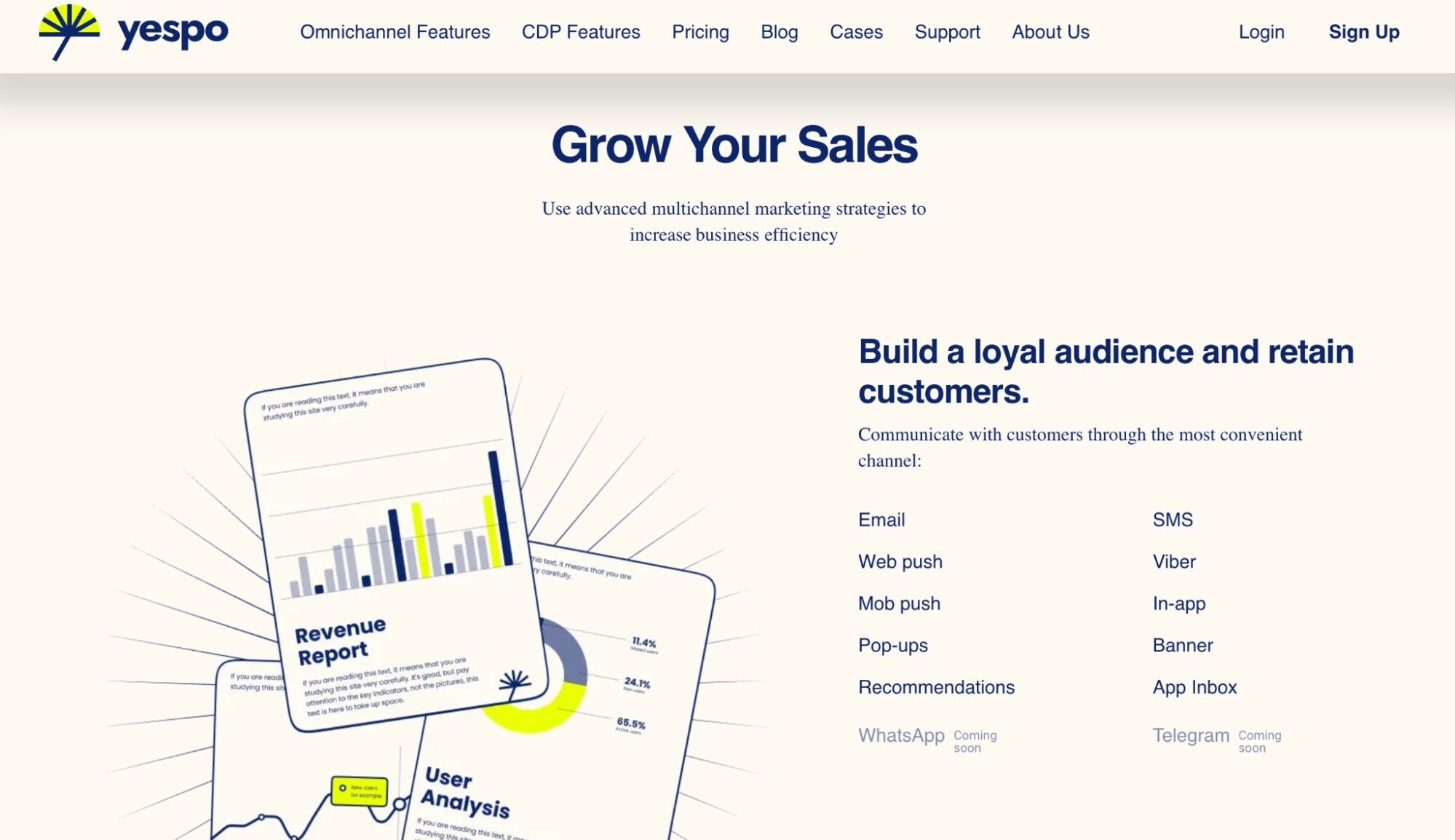
Yespo is an omnichannel customer data platform (CDP) that allows managing cross-channel messaging campaigns via Email, SMS, Web Push, Viber in a single system, segmenting the audience according to the customer's interests, creating product recommendations based on client's behavior and easily automate all your marketing activities.
Who is it ideal for?
For businesses at any stage of growth.
Features
- No need to segment the audience manually. Thanks to web-tracking scripts and AI algorithms, Yespo will do all the work automatically.
- Convenient CDP for zooming repeat sales and promoting customer loyalty.
Pros & Cons
|
Pros |
Cons |
|---|---|
|
Guidance through every stage of business development |
The setting up of event-triggered messages is a bit complicated. However, the dashboard is quite intuitive. |
|
Easy contact base management |
Pricing plan
- Advanced - $85/month,
- Professional - $280/month,
- Enterprise - the price is determined depending on the client's needs.
Verdict
Best omnichannel service.
2. Smartlead
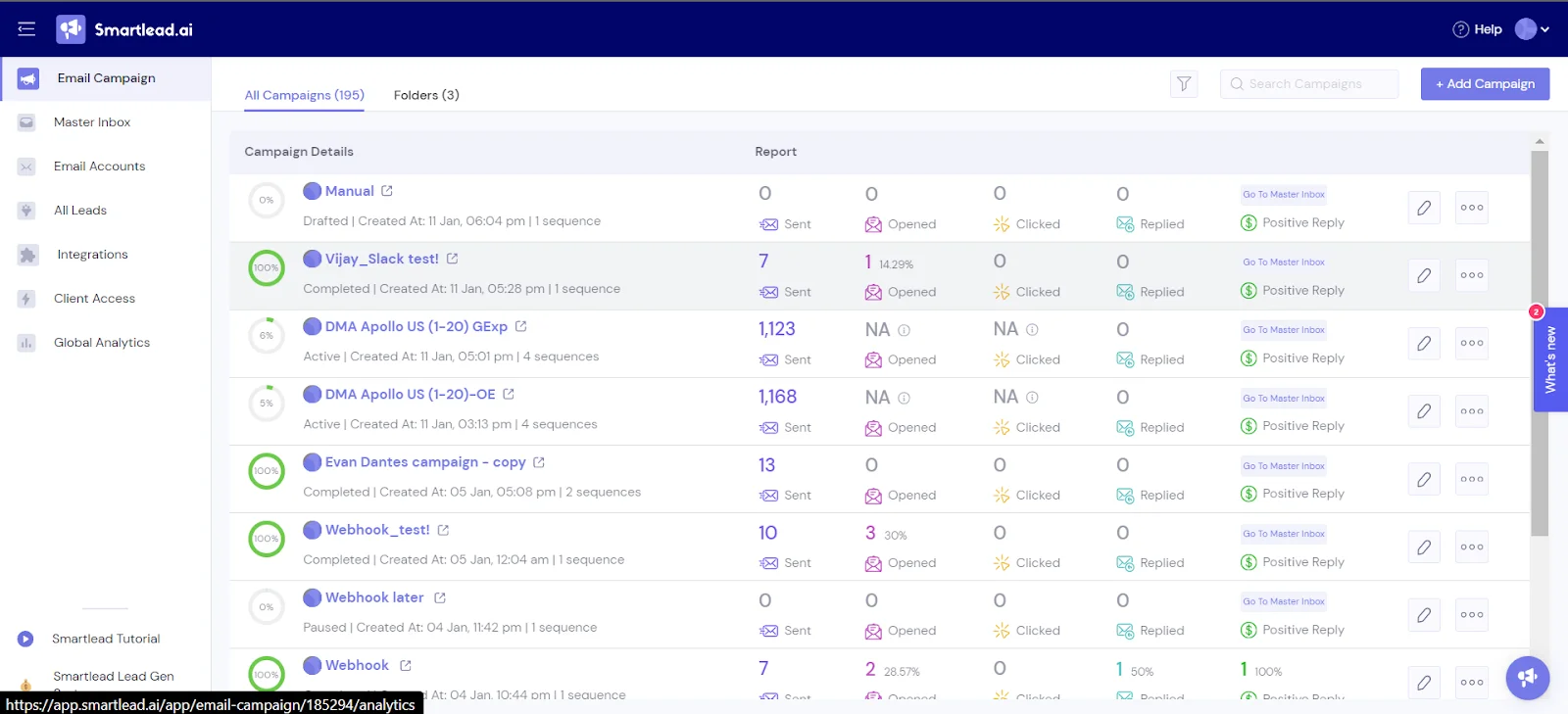
Smartlead is a cold-email powerhouse that keeps your messages out of the spam folder and in front of prospects. With native warm-ups, rotating inboxes, and a unified master inbox, you can scale outreach without babysitting deliverability.
Who is it ideal for?
Agencies, revenue teams, and founders who juggle dozens of inboxes and care more about reply rates than fancy templates.
Features
- AI-driven warm-up pool (25k+ mailboxes) – mimics natural sending and auto-tweaks volume based on risk signals.
- Smart Inbox Rotation – spreads sends across unlimited accounts so you can hit high daily volumes while staying invisible to ESPs.
- Centralised Master Inbox + Tagging – one dashboard for every thread, with custom tags for fast filtering and follow-up.
Pros & Cons
|
Pros |
Cons |
|
Unlimited warm-up on every paid plan |
Not built for newsletters |
|
ChatGPT-4 copy assistant on Pro and above |
UI can feel busy the first day |
Pricing Plan (monthly, cancel anytime)
- Basic – $39: 2 k active leads, 6 k emails, unlimited warm-ups.
- Pro – $94: 30 k leads, 150 k emails, ChatGPT-4, webhooks, unlimited seats.
- Custom – $174 +: up to 12 M leads and 60 M emails for scale-up agencies.
Verdict
If your goal is high-volume cold outreach that still lands in the primary tab, Smartlead is the tool to beat.
3. HubSpot
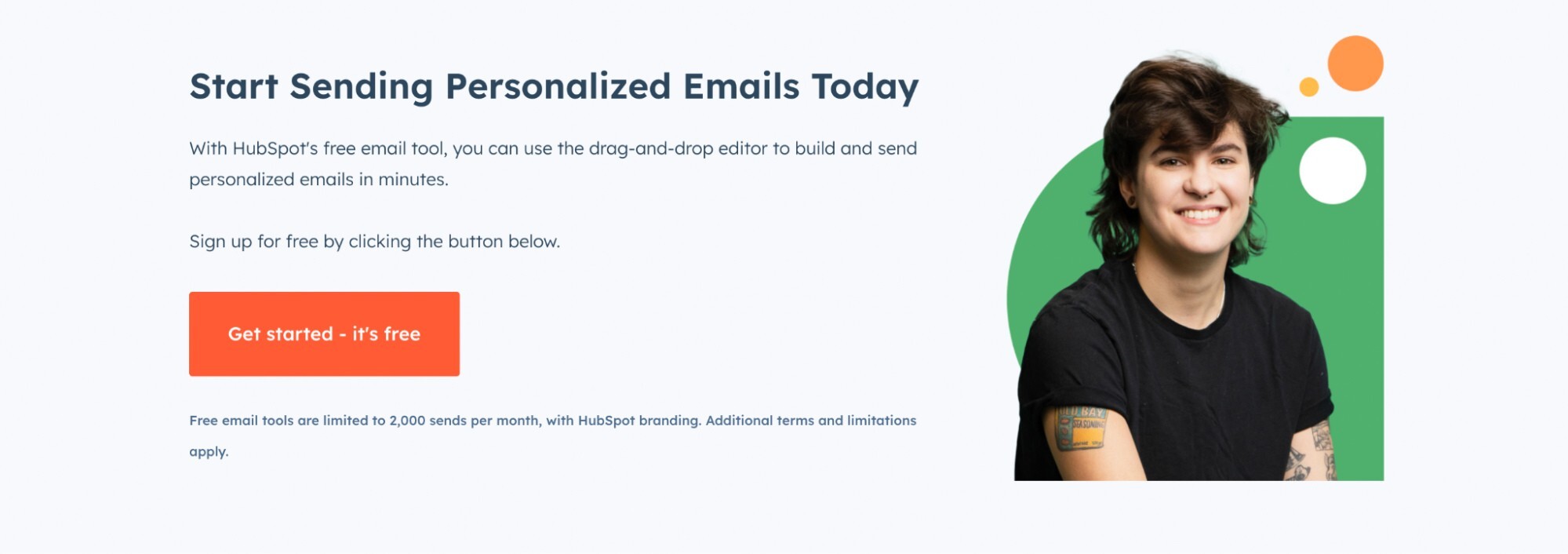
HubSpot is a comprehensive platform of tools for your small business email marketing, sales, and customer support teams and is a powerful digital marketing tool. A/B testing, send time optimization, analytics, marketing automation, and drip programs are all included in HubSpot.
Who is it ideal for?
For small-to-medium-sized businesses or enterprises, customers need a tool to help them manage everything from start to finish.
Features
- Even if you aren't using all of the features of HubSpot right now, it's still vital to become familiar with them because the platform has the ability to grow with your small business email marketing.
- You can design a report that can look at your clients throughout their whole customer experience, from the moment they first arrived on your website through their interactions with your support staff.
- The HubSpot Academy provides a variety of certifications and courses that may teach you more about email marketing for small businesses, sales, and customer support, in addition to how to use every feature of the platform.
Pros & Cons
|
Pros |
Cons |
|---|---|
|
All of your marketing, sales, and customer service data in one place |
CRM is not as "customizable" as other solutions |
|
Large app marketplace to connect your other instruments |
|
|
Free plan with CRM and free marketing, sales, service, and operations tools |
- Starter - $45/month,
- Professional - $800/month,
- Enterprise - $3,600/month.
Verdict
Best All-In-One Marketing Solution.
4. Userlist
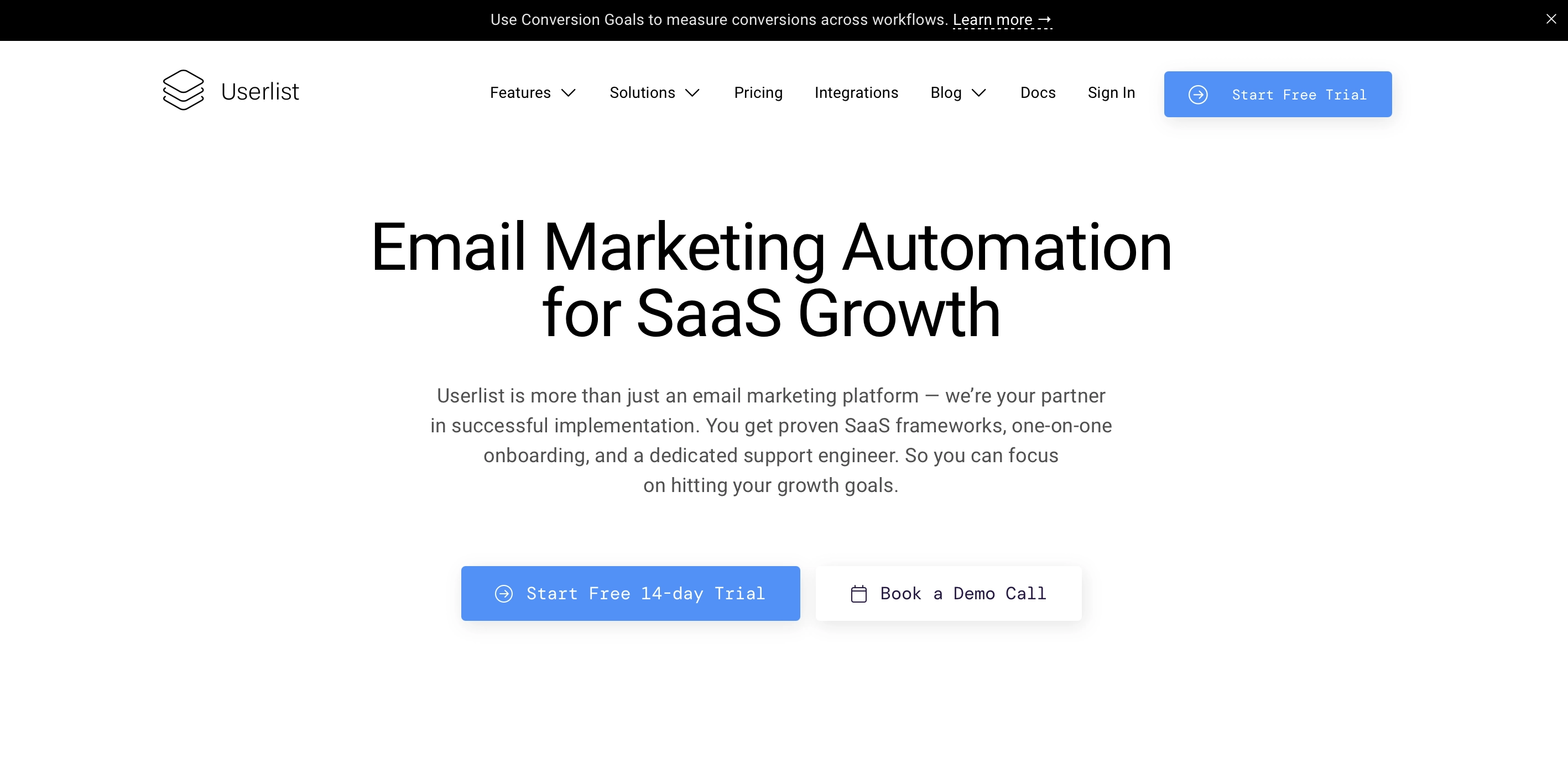
For SaaS companies looking to supercharge their email marketing efforts, Userlist stands out as the top choice. Built specifically for product-led growth, it helps businesses onboard, engage, and nurture both customers and marketing leads with ease—all in one platform. With Userlist, SaaS companies can deliver smarter, more personalized experiences, build stronger customer relationships, and achieve growth with proven frameworks and boutique-level support.
Who is it ideal for?
Userlist is perfect for SaaS companies that prioritize product-led growth and need a specialized tool for email marketing automation. It’s ideal for businesses looking to scale their email marketing efforts while focusing on customer journeys and behavior-driven communication.
Features
- Automation workflows: Design automated email journeys that respond to user behavior and help guide them through your product.
- Behavior-based emails: Trigger emails based on specific user actions, ensuring your messages are timely and relevant to each individual.
- Customer data tracking: Capture and track every user interaction to gain valuable insights and create personalized experiences.
- Segmentation: Easily segment your user base by behavior, subscription type, or any custom attribute, allowing for hyper-targeted campaigns.
- Broadcasts: Send out one-time emails or newsletters to your entire list or specific segments, ensuring that your message is always reaching the right people.
- In-app notifications: Engage users with personalized notifications directly in your app to drive action at the right moments.
- Dynamic email composer: Build dynamic emails that automatically adapt to the needs and preferences of the recipient, increasing relevance and engagement.
- Subscription preference center: Give your users control over their email preferences, leading to higher satisfaction, reduced unsubscribes, and better list quality.
Pros & Cons
|
Pros |
Cons |
|
Focused exclusively on SaaS businesses, offering specific workflows and automation. |
While this focus is a major strength, businesses outside the SaaS space may not benefit from its full potential. |
|
The platform is intuitive, making it simple to set up and manage automation without needing a technical background. |
|
|
Integrates well with other tools commonly used by SaaS businesses, like CRMs and data enrichment platforms and more. |
|
|
Userlist offers dedicated customer support to help with any issues or customization needs. |
|
Pricing plan
- Basic - 149$/month,
- Professional - 349$/month,
- Enterprise - Custom pricing plan.
Verdict
Email marketing automation for SaaS focused on product-led growth.
5. Beehiiv
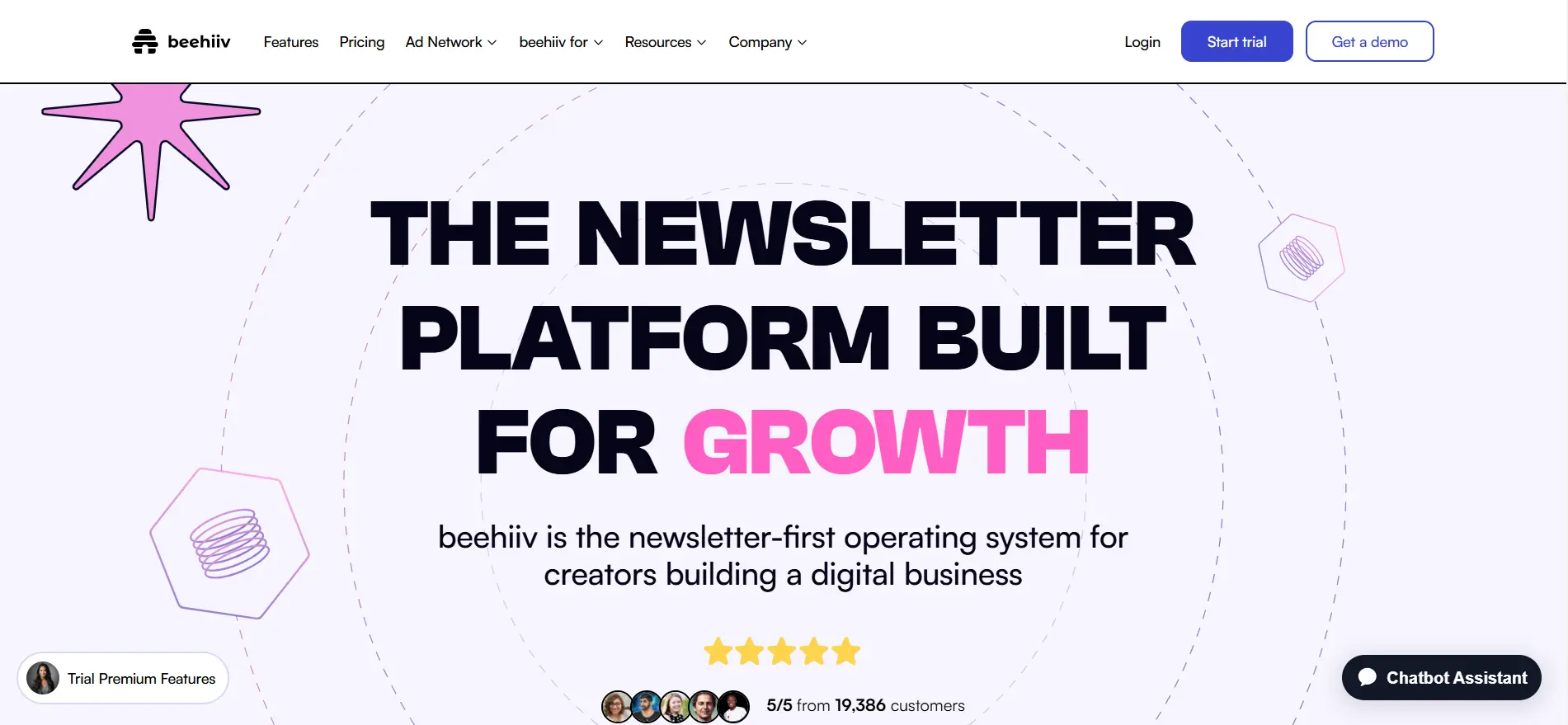
Beehiiv is a newsletter platform that keeps things simple. It combines blogging and email tools, so you can focus on creating, growing your audience, and even monetizing your content—without getting stuck on the technical side of things. It’s a straightforward, hassle-free way to share what you love.
You can get started for free, with an unlimited number of email campaigns. Once you get to 2,500 subscribers, you need to upgrade. But that’s a good thing, right? This means you’re moving in the right direction. When it’s time for an upgrade, follow this link to get a 30-day trial + 20% OFF for the first 3 months.
Who is it ideal for?
Content creators who want a platform that allows them to send custom newsletters with or without needing to have a website.
Features
- Beehiiv includes a unique feature that allows creators to transform their written newsletters into audio formats.
- No fees on paid memberships which means creators keep all their earnings while offering premium content to subscribers.
- Comprehensive analytics tools, including 3D analytics.
- Offers advanced cohort analysis tools that allow creators to segment their audience based on specific behaviors and interactions over time.
- Beehiiv allows creators to turn their newsletters into a Progressive Web App (PWA). This feature enables subscribers to add the newsletter site to their mobile home screens, providing an app-like experience.
Pros & Cons
|
Pros |
Cons |
|
Robust monetization tools (Ad Network, paid memberships) |
Some advanced SEO features are missing |
|
Intuitive and modern interface |
Gaps in integrations with third-party tools. |
|
Multiple newsletters in one account |
Limited website design customization |
|
Solid SEO features that help content rank well |
Pricing:
- Launch - free
- Scale - $39
- Max - $99
- Enterprise - Custom
Verdict:
Best for creating, managing, and monetizing newsletters.
6. Constant Contact
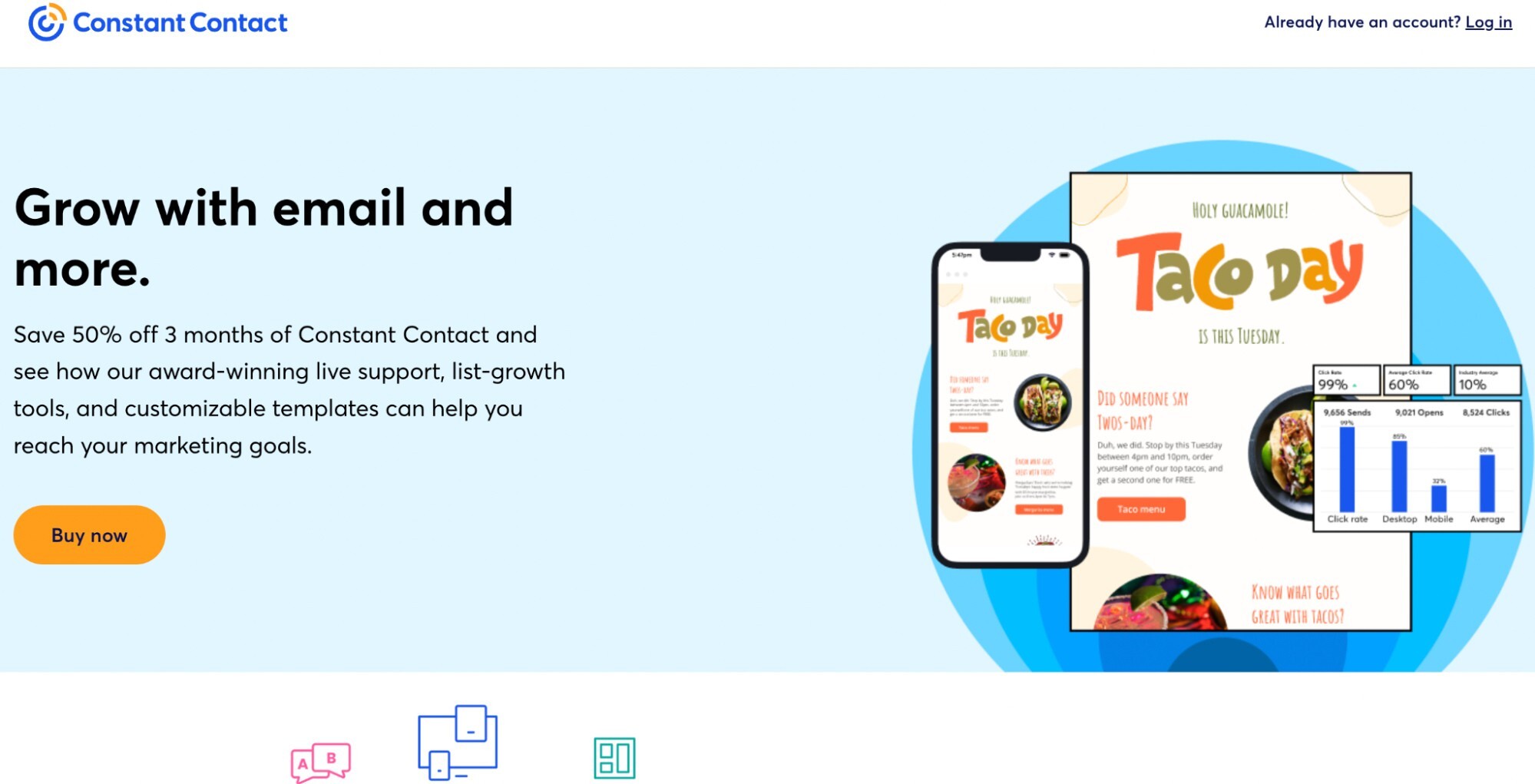
Constant Contact Email Plus accounts also include potent features for small business email marketing like email automation, surveys and polls, coupons, and online donations that allow you to send targeted emails and increase your open rate.
Additionally, Constant Contact provides live, in-person lectures all throughout the USA. This makes it possible for small business owners to swiftly grasp the fundamentals of email marketing and begin using it to expand their companies like pros.
Who is it ideal for?
For small growing businesses and startups.
Features
- Constant Contact provides unrivaled customer support via live chat, phone calls, email, community support, and a vast library of useful materials.
- You can send almost an infinite number of emails with Constant Contact's plans, which are charged according to the number of subscribers you have, as opposed to many of its rivals who place lower send restrictions.
- Service has a user-friendly email editor that makes it simple to alter the provided templates by automatically grabbing your logo, brand colors, and social media links from your company website.
Pros & Cons
|
Pros |
Cons |
|---|---|
|
30-day money-back guarantee |
The A/B testing feature is limited |
|
Affordable monthly plans |
|
|
Excellent customer support |
Pricing plan
- Core - $9,99/month,
- Plus - $45/month.
Verdict
Best for startups and small business email marketing.
7. Benchmark

All Benchmark’s plans include features like automation, lead generating, and reporting capabilities that make the service simple to use. Although the free edition lacks several essential capabilities valuable for small business email marketing, we considered these elements to be relatively constrained and basic.
Who is it ideal for?
For a private company or non-benefit affiliation.
Features
- Sophisticated automation capabilities like automated customer journey templates, behavior-based email follow-up, list management, and website engagement automation.
- Benchmark also provides Smart Content that is AI-powered. This copywriting tool may create new text from the start or revise already published content using straightforward inputs. Any small business email marketing audience, including B2B, B2C, and e-commerce, can be written for by this tool. With this feature's help, marketers can produce interesting content more quickly and therefore save time.
Pros & Cons
|
Pros |
Cons |
|---|---|
|
Easy-to-use interface |
Some tools for layout customization are absent |
|
Helpful automation |
|
|
Handy drag-and-drop email editor |
Pricing plan
- Pro - $13/month,
- Enterprise - $611/month.
Verdict
User-friendly service.
8. SendinBlue
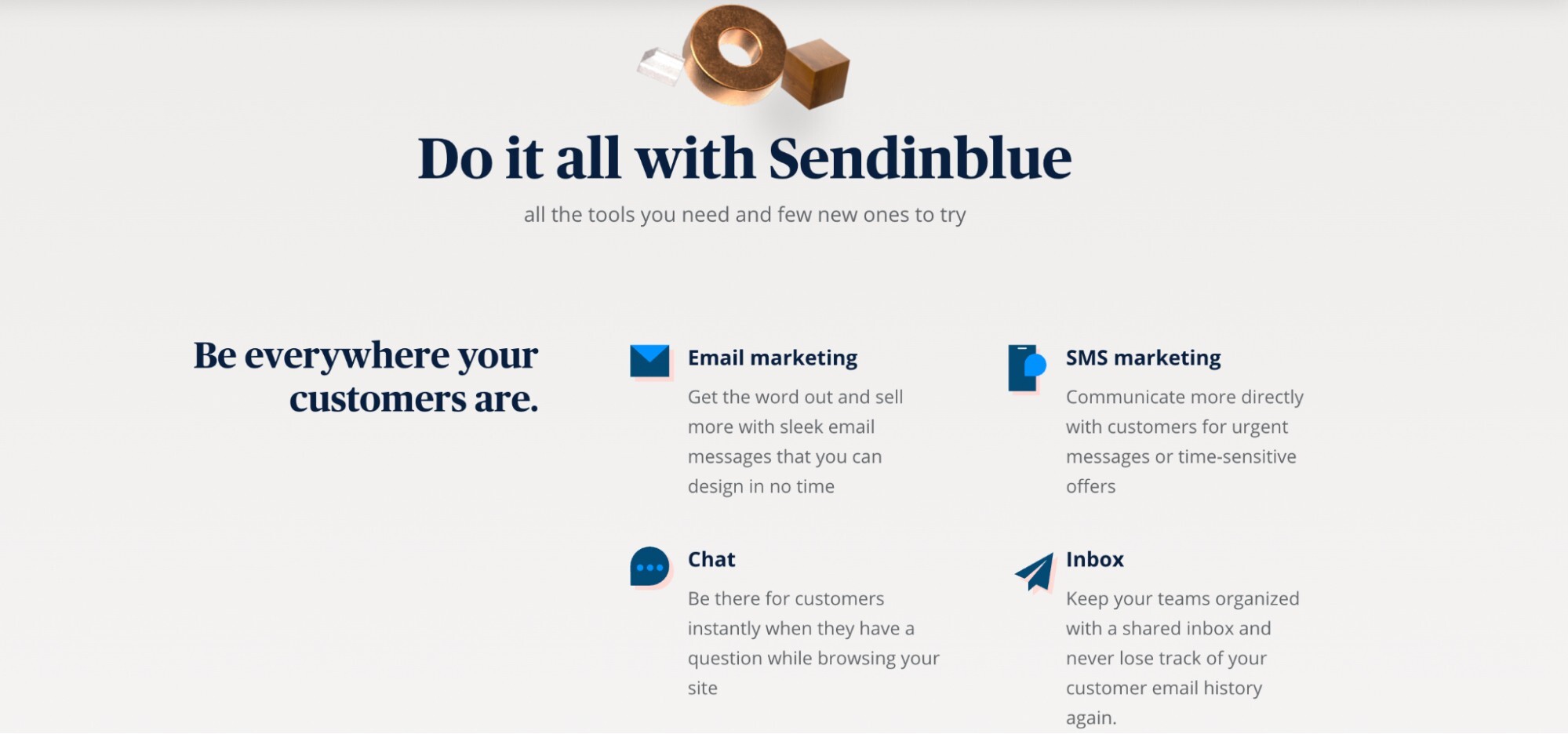
SendinBlue is an all-inclusive SMS and small business email marketing tool. To power automatic or transactional emails from your WordPress website, SendinBlue provides a different SMTP bulk email marketing service. Although you don't require this for email marketing campaigns, it's a wonderful feature if you have a huge website and want real-time, automated emails that are dependent on its content of it.
Who is it ideal for?
For a small business that has just started out and wants to automate marketing processes.
Features
- The A/B testing tool helps you determine what message to send to whom and at what time, ensuring that they reach your target audience and increase engagement.
- Sendinblue helps you personalize and curate content by dynamically adding text, such as your contact’s name to the email body.
- You can group your audience into various segments using multiple filters to send them more targeted content.
Pros & Cons
|
Pros |
Cons |
|---|---|
|
Сlear and useful dashboards |
Customer support is dependant of the chosen plan |
|
Simple Salesforce app integration |
|
|
Unlimited automation branching |
Pricing plan
- Starter - $25/month,
- Business - $65/month,
- Enterprise - $1000/month.
Verdict
Best marketing automation.
9. Drip
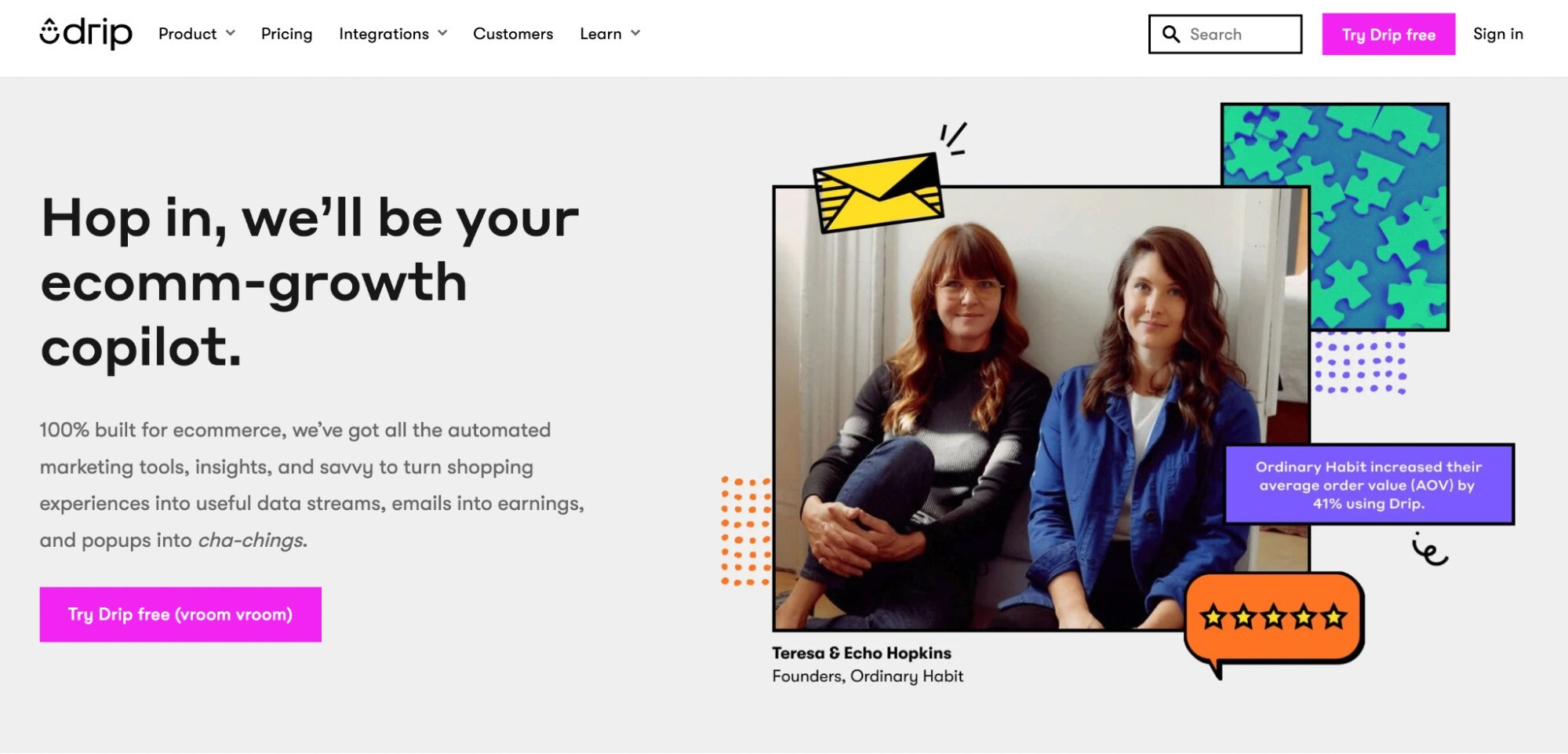
Among small business email marketing services Drip provides, the most important is the seamless connection for all the most commonly used website builders, such as WordPress and WooCommerce, with their email software. As a result, adding pop-ups or opt-in forms to your website is simple, enabling you to collect more leads. To increase conversion, you can use email popup examples.
Drip also has email segmenting, list groups, split testing features, and a visual drag-and-drop builder for automation workflows so you can reach targeted customers.
Important to note that Drip is a platform that is very focused and leans toward the DIY ("Do it yourself") philosophy. That's acceptable to some but might be unacceptable to others.
Who is it ideal for?
For small companies that love DIY philosophy.
Features
- SMS notification is a feature to all plans which allows you to connect with your users on both email and SMS marketing channels.
- Ability to easily add pop-ups or opt-in sign-up forms to the website and capture more leads.
Pros & Cons
|
Pros |
Cons |
|---|---|
|
With smart eCommerce marketing automation, you can send bulk emails while interacting and connecting with each consumer personally |
There are almost no templates to choose from |
|
Thanks to an eCommerce revenue attribution feature, you can see how much money you make from each email marketing campaign |
Pricing plan
-
$39/month.
Verdict
Best analytics and reporting.
10. Moosend

With Moosend you can move, crop, resize, group, add and change anything you want to create stunning landing pages in just a few clicks.
The email template editor is simple and functional. It enables you to arrange your information using a selection of straightforward layouts. You can add other elements like images, text, buttons, article previews, social sharing and follow buttons, and more.
Who is it ideal for?
For small business email marketing interested in automation and deliverability features.
Features
- You can display or conceal content based on the subscribers' access to custom fields.
- You can also import your own images from services like Facebook, Google Drive, Dropbox, Instagram, and OneDrive.
Pros & Cons
|
Pros |
Cons |
|---|---|
|
70 ready-made design choices, arranged in categories like Abstract, Corporate, E-Commerce, Real Estate, and more |
Only Windows system fonts |
|
You can import your contacts from Google Contacts and Salesforce |
No support for right-to-left (RTL) languages such as Hebrew or Arabic |
|
Modern landing page templates trending toward flat design |
Pricing plan
-
Pro - $9/month,
- Enterprise - the price is determined depending on the needs of the client.
Verdict
The most trend-following service.
11. AWeber
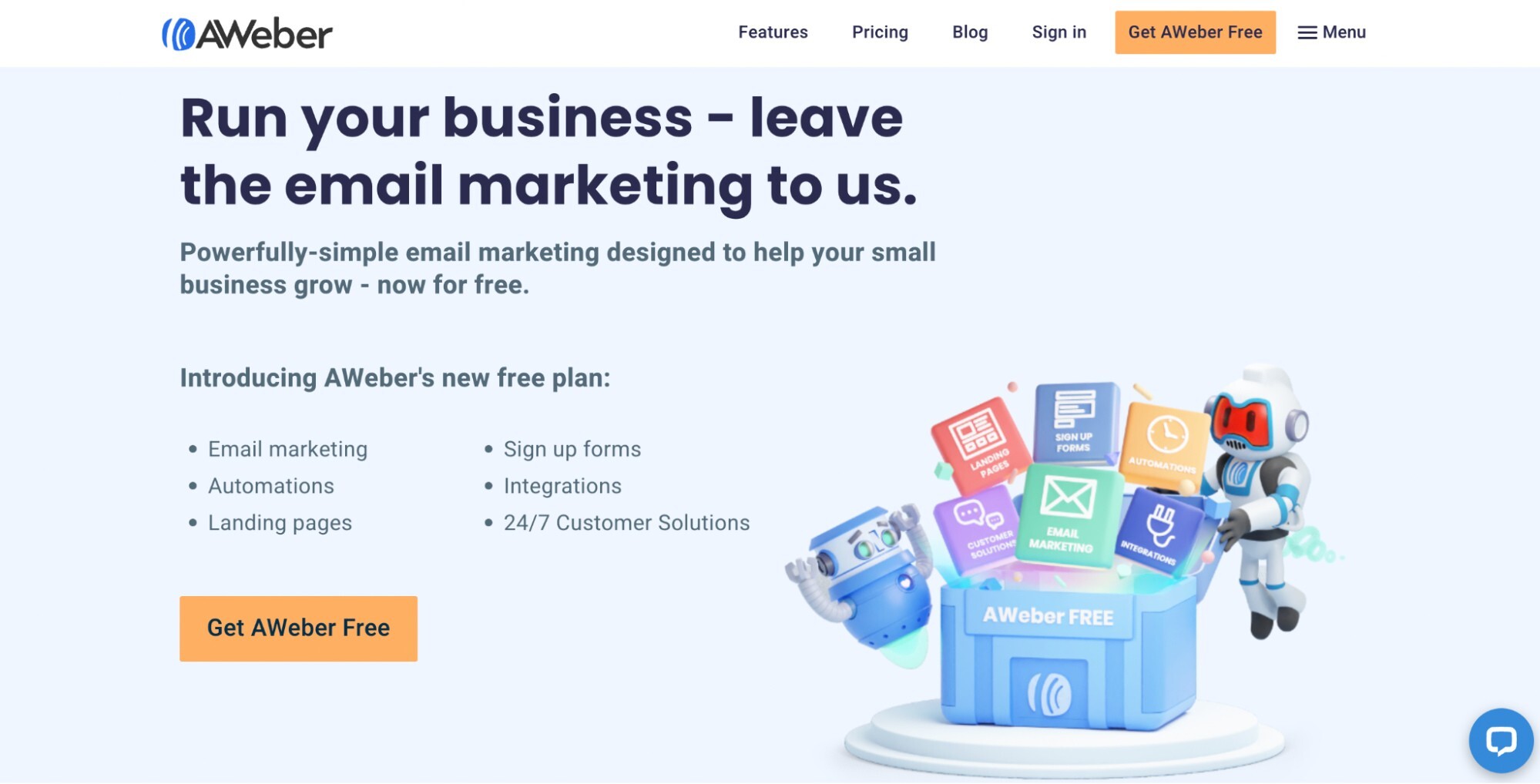
The most remarkable feature of AWeber is DKIM authentication. DKIM is an email marketing software for small businesses that employs encryption to identify your email's origin for the servers that receive it. It verifies that your website, or at the very least your domain name, is the source of the email. DKIM notifies the receiving servers that your email is less likely to contain malicious code or be spam.
Affiliate marketing is permitted by AWeber as well. You must distribute those affiliate links to those who have signed up for them, and the affiliate marketing programs you join must be legal and compliant with AWeber's policies. But it's permitted.
Who is it ideal for?
For eCommerce, digital marketers, and bloggers.
Features
- AWeber has AMP emails, automatic RSS-to-email for bloggers, and tag-based subscriber segmentation.
- Based on the contact's name, any tags you've given them, their location, email, IP address, and many other factors, you can make information appear (or, conversely, hide).
Pros & Cons
|
Pros |
Cons |
|---|---|
|
Drag-and-drop editor with 700+ templates |
Does not offer dedicated IP addresses |
|
Library of 6,500 stock images |
Pricing plan
- $20/month.
Verdict
The most responsive support service for small business email marketing.
12. Campaign Monitor
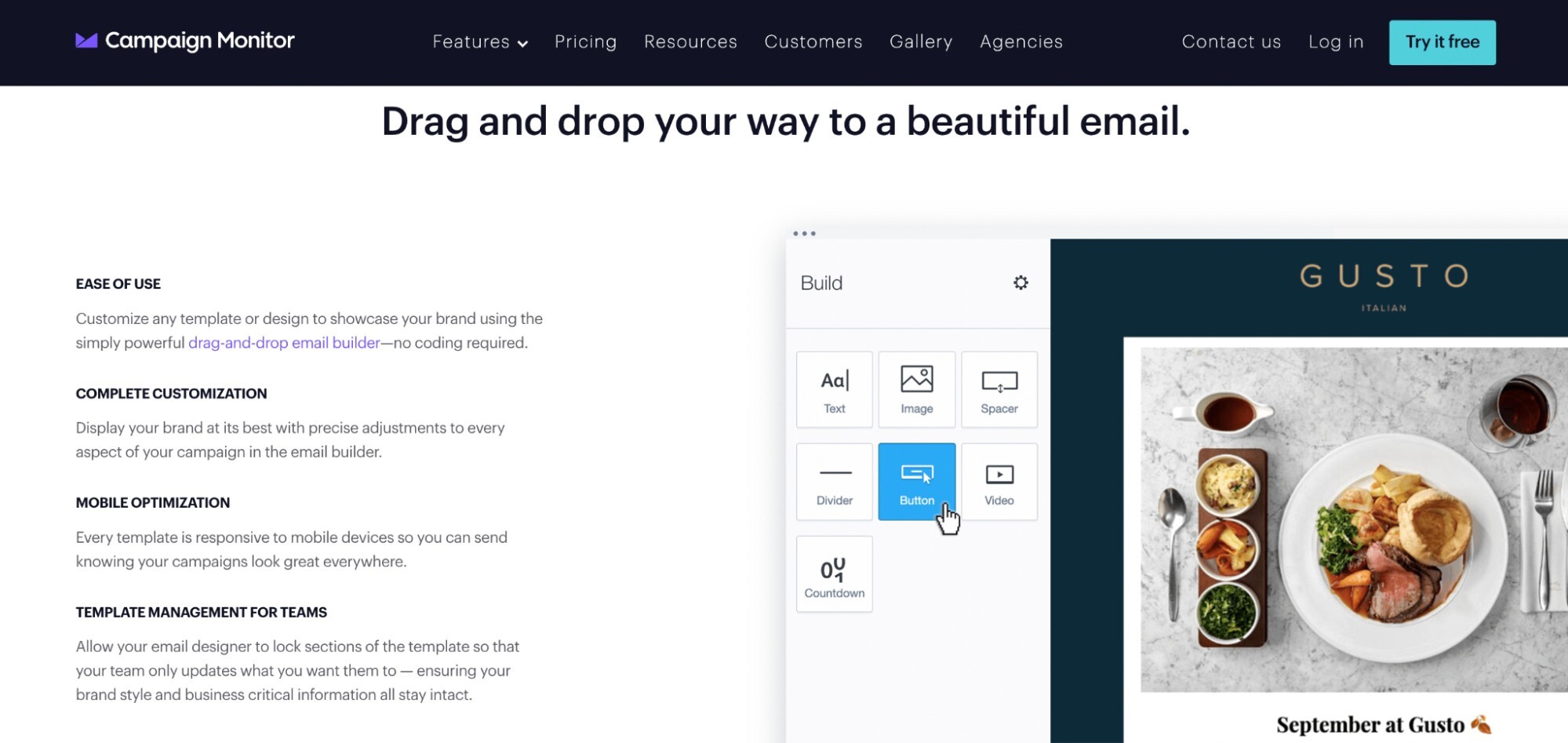
Campaign Monitor is an intuitive solution for email marketing for small businesses. It enables business owners of expanding enterprises to send lovely, pertinent newsletters, establishing a trustworthy channel to increase contact with their subscribers and encourage devoted readership. Marketers can easily provide tailored content to massive lists of subscribers because of lovely templates, drag-and-drop UI, and engagement-based segmentation.
Who is it ideal for?
For small businesses and the Marketing & Advertising industry.
Features
- Your email designer can lock sections of the template so that your team only updates what you want them to — ensuring your brand style and business-critical information all stay intact.
- Through capabilities including deliverability checks, opt-in management, bounce handling, suppression lists, dedicated IP addresses, and delivery monitoring, the software helps ensure that email messages are delivered to recipients' inboxes.
Pros & Cons
|
Pros |
Cons |
|---|---|
|
Template management for teams |
Lack of Premium Consulting / Integration Services |
|
Users can test dynamic content before launching a campaign |
Pricing plan
- Basic - $9/month,
- Unlimited $29/month,
- Premier -$149/month.
Verdict
Best for maximizing marketing initiatives.
How to Choose Small Business Email Marketing Services that Suit Your Strategy?
Email marketing software for small businesses is one of the best ways to increase clicks to your website, increase brand awareness, and generally stay top of mind for your current and potential customers. Do they like your subject lines? Are they still clicking the buttons on your emails? What kind of products do they buy? With the right platforms, you can easily find the answers to these questions.
So, how to choose the right email marketing services for small businesses?
1. Determine the email types
To make your emails personalized, you can choose from a variety of email formats:
- for newsletters, the email marketing system will need to enable building the address file from the site's forms, creating messages, and tracking performance;
- to send transactional emails, the technology must be flawlessly linked with your website or e-commerce platform;
- favor automated marketing platforms over scripted emails will assist you in broadly achieving your business objectives because they are more thorough. The chosen platform should offer tracking information, if necessary, to assess the effectiveness and caliber of your efforts.
2. Test the solution
Reduce the list of viable tools after determining your needs and the suggestions made by the various platforms, and then spend some time testing them. Instruct your team members to utilize the program for small business email marketing as they normally would. Spend some time deciding on the course of action that will make it simpler to satisfy your client's needs while adhering to your principles.
3. Prioritize segmentation
Any legitimate emailing system must have segmentation criteria so that you can generate contact lists for contacts based on their gender, age, or region. When integrated with your CRM or CMS, some solutions will even let you segment based on customer behavior, such as the date of their most recent purchase, their visitation to a specific page on your website, or their abandonment of their shopping cart. This segmentation is a crucial part of email marketing for small businesses so that you can deliver targeted, customized emails.
4. Examine potential connections to other technologies you use
Your CRM is your best friend while working in digital marketing. It takes a lot of time to manually update lists and send emails. You can manage content and customer data quickly and segment it for better targeting by selecting an email marketing platform that connects flawlessly with your CRM.
5. Give a tool with customizable playback and display
It goes without saying that you must be able to alter how your emails look, including their colors, the placement of your logo and other graphics, the inclusion of the recipient's first or last name, etc. The ideal emailing system offers a large selection of responsive, easily customizable, pre-designed layouts. It's important to select an email marketing tool with mobile-friendly features and designs. Your efforts will be ineffective if a customer opens an email on a smartphone that doesn't display properly.
Choosing the right small business email marketing services is crucial, so now that you have all the necessary tools and tips, all you need to do is start creating magical marketing campaigns.






